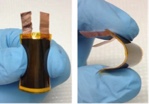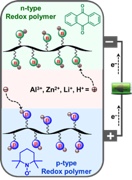Metal-ion batteries
There are four main research lines in static batteries
Structural Li-ion batteries
 We are developing a new generation of multifunctional fire-safe batteries with augmented mechanical properties and compatible with composite fabrication routes. Such initiative aims at producing a platform of core knowledge and methods that can be used to develop specific battery technologies for different applications.
We are developing a new generation of multifunctional fire-safe batteries with augmented mechanical properties and compatible with composite fabrication routes. Such initiative aims at producing a platform of core knowledge and methods that can be used to develop specific battery technologies for different applications.
Semi-solid Li-ion batteries
 We are working on lowering the cost of Li-ion batteries by developing devices based on semi-solid electrodes. The main advantage of semi-solid electrodes is their higher porosity, which results in higher Li-ion transfer and enables the fabrication of thicker electrodes. In this way, the amount of inactive materials such as current collectors and separators is minimized.
We are working on lowering the cost of Li-ion batteries by developing devices based on semi-solid electrodes. The main advantage of semi-solid electrodes is their higher porosity, which results in higher Li-ion transfer and enables the fabrication of thicker electrodes. In this way, the amount of inactive materials such as current collectors and separators is minimized.
Al-ion batteries
We are interested in aluminium batteries due to the high theoretical gravimetric capacity of aluminium (2.98 Ah g-1), its volumetric capacity (8.04 Ah cm-3), its low cost, high abundance and safety. We have identified a series of critical issues that need to be addressed for this  technology to become commercialized: more efficient Al-plating, cheaper electrolyte, corrosive-resistant current collectors and thicker electrodes.
technology to become commercialized: more efficient Al-plating, cheaper electrolyte, corrosive-resistant current collectors and thicker electrodes.
Redox polymer batteries
We are also developing novel redox polymer based organic electrode materials for the design of “next-generation” safe, low-cost, large-scalable and sustainable electrochemical technologies by taking advantage of their numerous intriguing electrochemical properties, including high-theoretical specific capacity, structural diversity, tunable redox potentials, fast kinetics as well as potential compatibility with post-lithium chemistries.
Selected publications:
Patil, Nagaraj; Jerome, Christine; Detrembleur, Christophe; Palma, Jesús; Mavrandonakis, Andreas; Marcilla, Rebeca* Polymers Bearing Catechol Pendants as Universal Hosts for Aqueous Rechargeable H+, Li- and Post Li-Ion (Mono-, Di- and Trivalent) Batteries. ACS Applied Energy Materials, 2019, 2, 5, 3035-3041. DOI: 10.1021/acsaem.9b00443
David Muñoz-Torrero, Antonio Molina, Jesús Palma, Edgar Ventosa, Rebeca Marcilla. "Widely commercial carbonaceous materials as cathode for Al-ion batteries" Journal: Carbon. 2020, 167, 475-484. DOI:10.1016/j.carbon.2020.06.019
R&D Projects:
SUSBAT – Computer-aimed macromolecular design of redox-active polymers: promising paradigm for sustainable battery research and development
INBAT – Injectable batteries of semi-solid electrodes
Development of Semi-solid efficient fuel for next generation batteries
Instead of preparing solid electrodes as in Li-ion batteries or dissolving materials as in convectional redox flow batteries, this project aims to join the better of both technologies by using suspensions of solid particles based on the materials currently used in the electrodes of lithium-ion batteries. In this way, a suspension is obtained that combines the high energy densities of the lithium ion materials with the versatility in the recharging processes of the flow batteries. With this strategy, the energy density could be multiplied by ten, reducing the volume of the 1000 litre tanks that would be needed with current technology, to less than 100 litres (for 100 km).
STRUBAT – Development of Mechanically Robust Structural Li-ion Batteries
STRUBAT project aims to develop structural Li-ion batteries with dual function of energy storage and mechanical robustness. This project involves the development of flexible and mechanically stable electrodes, novel solid-state polymer electrolytes and their integration into structural devices. Therefore, the research activities will be focused on the fabrication of high-performance electrode materials with desired structural and electrochemical performance followed by their integration in carbon fibre composite laminates to produce structural batteries.
POLYSTORAGE –European Training Network in Innovative Polymwers for Next-Gneration Electrochemical Energy Storage
POLYSTORAGE-ETN aims to develop high quality training opportunities for 16 early-stage-researchers (ESRs) in the area of “Polymers for Next Generation Electrochemical Energy Storage”. The final objective is to train materials scientists who will be the future leaders to face some of the upcoming European energy and environmental challenges. Well balanced combination of fundamental and basic material&polymer science with applied research in advanced energy storage devices is a key aspect of this training network. POLYSTORAGE gathers together 12 beneficiaries (incl. 2 industries) and 11 partners (incl. 9 industries) internationally renowned for their research and training activities in polymer science and energy storage. IMDEA Energy will train 2 ESRs within the ETN. One on “Development of conjugated porous polymers with enhanced electrochemical properties”, and the second one on “Development of redox-active colloids/suspensions for semi-solid redox flow batteries”.
http://www.polystorage-etn.eu/


